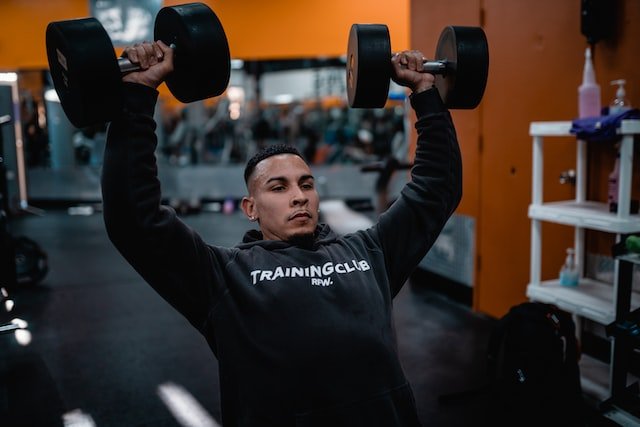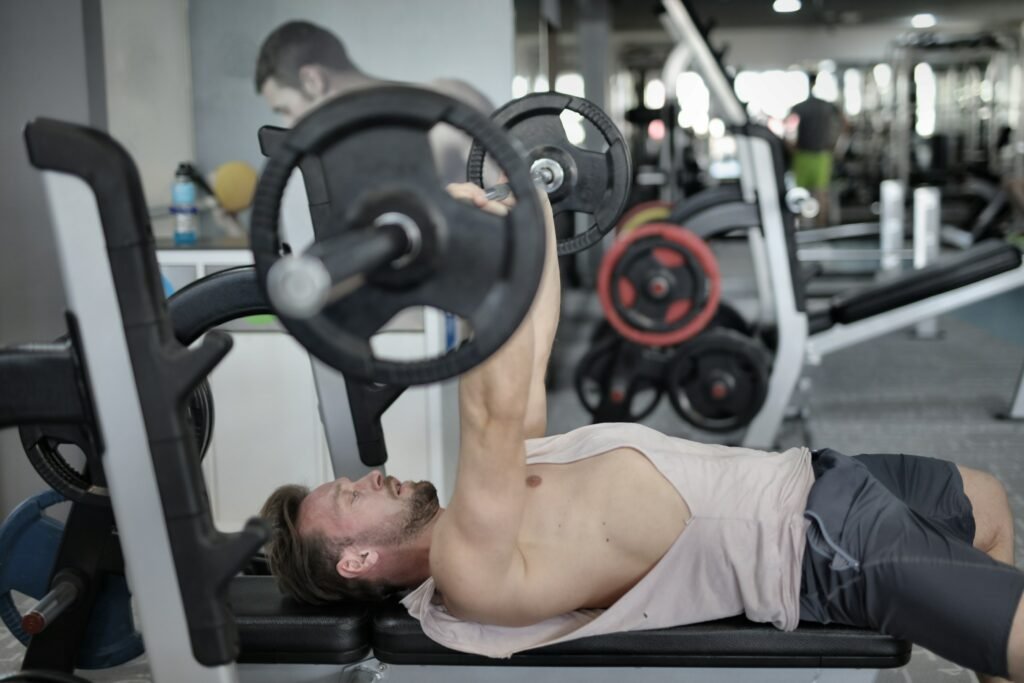
Can’t Do Shoulder Press? Problem Solved Here
If you’ve ever ventured into the weight section of a gym, you’ve probably seen people doing shoulder press.
This exercise is meant to work your shoulders and upper back, but for some reason, it just doesn’t feel right for you.
You’ve tried over and over again, but every time, your shoulder starts to ache halfway through the set.
It can be frustrating when this happens, especially when you see other people doing the exercise with no problem.
What’s going on, why can’t you do shoulder press? Read on to find out how you can fix the problem.
Why can’t I do shoulder press?
There might be a very good reason why you can’t do shoulder press, but what is it that’s holding you back? You may have a restricted or poor range of motion from a previous injury, rotator cuff issue or ligament problem…which can make the shoulder press difficult to pull off competently. It can also be due to dislocation problems or simply a lack of strength in your core, back, and shoulders, as you need to engage your whole body for the press to be successful. In some cases, it might be because you’re using incorrect form or trying to lift too heavy. It’s also possible that your goals are unrealistic or that you’re overusing your shoulders through day-to-day tasks for work or play. Are you doing the exercise correctly? Is your grip and grip width correct? Are you breathing properly? Are you specifically targeting your shoulders or not? Once you’ve addressed these questions, you might find that shoulder press isn’t so difficult after all. If you’re still having trouble, there are alternative shoulder exercises you can do, maybe consider building your strength by doing a seated shoulder press, then once you feel more confident progress to standing shoulder press. Be wary of shoulder press machines, as they can feel uncomfortable at times (they do for me) and concentrate on using lighter dumbbells, a very light barbell or even a single-weight plate to build strength and confidence with the exercise. Set small and achievable goals, such as adding an extra rep or two each week, and soon you’ll be pressing your way to success.
There might be a valid reason why you aren’t able to do shoulder press, so let’s look a little bit more in-depth at why this might be the case.
Poor range of motion
If you have a previous injury, rotator cuff problems or ligament issues, this can all contribute to poor range of motion in your shoulders.
This makes it difficult to do shoulder press, as you simply might not be able to raise your arms high enough. If this is the case, it’s best to seek professional help, as you might need physiotherapy or other treatment to improve your range of motion.
In the meantime, there are other exercises you can do that don’t require such a wide range of motion in your shoulders. Seated shoulder press is a good option, as you can support your back against a chair or bench.
You might also want to try some front raises, lateral raises or rear delt flyes to work your shoulder muscles in a different way.
Also, make sure you are warming up your shoulders before attempting any exercises by doing some gentle arm circles or shoulder rolls. This will help to loosen up your muscles and prepare them for the workout ahead.
Lack of strength
If you Lack strength in your core, back and shoulders, this can make shoulder press more difficult.
This is because you need to engage your whole body to do the exercise correctly, and if any of these muscle groups are weak, it can make the exercise harder.
The best way to overcome this is to focus on building up your strength in these areas with other exercises.
Some good exercises to try are planks, rows and Superman holds to work your back muscles; sit-ups, crunches and Russian twists to work your core; and handstands, wall walks and farmer’s carries to work your shoulders.
Once you’ve built up your strength in these areas, you should find that shoulder press becomes easier, but remember to make sure you start off light to get the correct technique before progressing to heavier weights.

Dislocation problems
If you have a history of dislocation problems, this can make shoulder press more difficult.
This is because the exercise requires a wide range of motion in your shoulders, which can be difficult if your joints are prone to dislocation.
Regular shoulder dislocations can also lead to the development of shoulder instability, which can make the exercise even harder.
This is because your shoulder joint is not as stable as it should be, and the weight of the dumbbells or barbell can cause your shoulder to dislocate.
Plus if you are aware that your shoulders are prone to dislocation, this can make the exercise feel more difficult mentally, as you might be constantly worried about your shoulders popping out of joint.
If you have dislocation problems, it’s best to seek professional help to see if there are any exercises or stretches you can do to improve your shoulder stability.
In the meantime, you might want to try some other exercises that don’t require such a wide range of motion.
Related: Does my bench press affect my overhead press?
Incorrect form
If you are using the incorrect form when doing shoulder press, this can make the exercise much harder than it needs to be.
This is because you are not using your muscles in the most efficient way, and you might be putting unnecessary strain on your joints.
This can lead to pain or even injuries in the long run, so it’s important to make sure you are doing the exercise with good form.
Some common mistakes include arching your back, thrusting your hips forward, flaring your elbows out to the sides and lifting your head up off the ground.
All of these things can make the exercise harder and can lead to injuries, so it’s important to focus on keeping your form correct.
If you’re not sure how to do shoulder press with good form, it’s best to seek professional help from a personal trainer or coach.
Trying to lift too heavy
If the weight you’re trying to shoulder press is too heavy, it’ll make the exercise more difficult than necessary.
This is because your muscles will not be able to generate the force needed to lift the weight, and you might end up straining your joints or even injuring yourself.
It’s important to make sure you’re using a weight that is appropriate for your strength level, and to focus on gradually increasing the weight as you get stronger.
Trying to lift too heavy and ego lifting are the most common problems people face when working out.
Ego lifting is when you try to lift a weight that is too heavy for you, in an attempt to impress other people or boost your ego.
This is not only dangerous, but it’s also pointless, as you’re not actually going to build any muscle or strength by doing this.
It’s important to be aware of your limits and to focus on gradually increasing the weight you’re using, which will enable you to progress consistently.
Do you have unrealistic goals?
Unreasonable goals can make any task harder than it has to be and the shoulder press is no exception.
This is because you might be trying to achieve something that is not possible, or you might be putting too much pressure on yourself to achieve a certain goal.
It’s important to make sure your goals are realistic and attainable and to focus on making progress gradually.
You might also want to consider why you’re trying to do shoulder press in the first place.
If your goal is to build muscle and strength, there are other exercises that are more effective than shoulder press.
If your goal is to improve your shoulder mobility or range of motion, there are also other exercises that might be more suitable.
It’s important to choose exercises that are appropriate for your goals and to focus on making progress gradually.

Shoulder overuse
If you find that you can’t do shoulder press because your shoulders are always sore or feel fatigued, it’s possible that you’re overusing them.
This is often the case if you’re doing the exercise too often, you’re using too much weight or you have a profession which requires manual handling or lifting.
It’s important to take regular breaks from exercise and to make sure you’re not overdoing it.
It’s important to make sure you’re giving your shoulders enough time to recover between workouts and to focus on gradually increasing the weight you’re using.
If you also engage in physically demanding activities regularly such as sports, it’s important to schedule regular breaks from shoulder exercises to let your muscles recover.
Related: Why Is Shoulder Press So Hard?
Grip and grip width
The width of your grip can have a big impact on how easy or difficult shoulder press is.
If you have a narrow grip, it’ll make the exercise harder as you won’t be able to generate as much force.
If you have a wide grip, it’ll make the exercise easier as you’ll be able to generate more force.
It’s important to experiment with different grip widths and to find the one that is most comfortable and allows you to generate the most force.
You might also want to experiment with different grip types such as a pronated grip, supinated grip or neutral grip.
Pronated grip is when your palms are facing down, supinated grip is when your palms are facing up and neutral grip is when your palms are facing each other.
This can make a massive difference, due to the fact, certain grip positions can feel uncomfortable or might even cause pain.
It’s important to experiment with different grip positions and find the one that is most comfortable for you, as the shoulder joint is a sensitive area.
Your not breathing correctly
Breathing is an often overlooked aspect of exercise, but it’s actually very important.
If you’re not breathing correctly, it can make exercise much more difficult than it has to be.
This is because you won’t be able to get enough oxygen to your muscles and you’ll also be more likely to feel lightheaded or dizzy.
When you exert yourself physically, it’s important to take deep breaths in through your nose and out through your mouth, this is because it’s the most efficient way to get oxygen to your muscles.
It’s also important to breathe out when you’re exerting yourself, as this will help to get rid of the build-up of carbon dioxide in your body.
Make sure to breathe slowly and deeply, filling your lungs completely before exhaling.
It’s also important to make sure you’re not holding your breath, as this can increase your blood pressure and make you feel lightheaded.
If you find yourself holding your breath, it’s a good idea to take a break and focus on breathing deeply and slowly until you feel better.
This is why it’s important to focus on your breathing and make sure you’re doing it correctly.
Variety and imbalances
The shoulder press is a great exercise for targeting the shoulders, but it’s also important to focus on other exercises that work the muscles around the shoulder joint.
This includes exercises such as the lateral raise, front raise, rear delt fly and upright row.
It’s important to focus on a variety of different exercises, as this will help to ensure that all the muscles around the shoulder joint are being worked.
If you only focus on the shoulder press, you’re likely to develop imbalances and this can lead to injuries.
It’s also important to make sure you’re using a variety of different weights and rep ranges, as this will help to ensure that all the muscles around the shoulder joint are being worked.
If you only use a heavy weight and low reps, you’re likely to develop imbalances and this can lead to injuries.
Similarly, if you aren’t actually taking the time to improve your shoulder strength and are only working them during other exercises (i.e. when doing chest or back work) then you’re not giving them the attention they deserve and this can also lead to imbalances and injuries.
So make sure you’re giving them the attention they deserve and focus on a variety of different exercises, rep ranges and weights.
Related: How Much Of Your Body Weight Should You Be Able To Overhead Press?
Final thoughts…
The shoulder press is a great exercise for targeting the shoulders, but there are a few things you need to keep in mind in order to ensure that you’re doing it correctly and safely.
First, make sure you have a good range of motion and that you’re using the right grip position.
Second, focus on your breathing and make sure you’re taking deep breaths in through your nose and out through your mouth.
Finally, make sure you’re focusing on a variety of different exercises, as this will help to ensure that all the muscles around the shoulder joint are being worked.
If you keep these things in mind, you’ll be sure to get the most out of your shoulder press and avoid any injuries.
Have you encountered this and did you sort the problem? Let me know in the comments section below.


